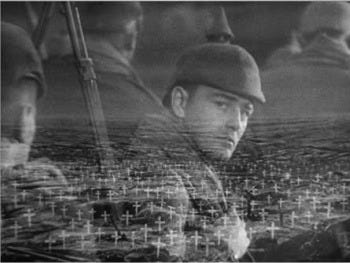And the Nominees Were - 1929/1930

The 3rd Academy Awards has been the best set so far because they moved beyond their reactionary fascination with sound. I’m sure there were still a lot of movies during this time that were devoid of story, but at least they weren’t being applauded with awards. This is still not a perfect set. I disliked more of them than I liked, but they were more interesting at least. Also it’s always a nice feeling when the best movie wins the prize.
All Quiet on the Western Front – WINNER
This is the war film to compare all other war films to. It’s based off the Pultizer Prize winning novel and is an incredibly worthy adaptation. It is the tale of a group of German students who are recruited to fight in the First World War. There they learn that it is not a place of heroes. Innocence is broken down in an incredibly naturalistic way. The war scenes are impressive and they convey this subtle sense of futility. Even with some occasionally clunky dialog, this movie deserves its title as a masterpiece.
The Big House
This movie is not a masterpiece. It’s an attempt to be gritty, but ends up being stupid most of the time. Robert Montgomery—Yes, that Robert Montgomery—is recently admitted into the state prison. He is cellmates with Wallace Beery and the growingly annoying Chester Morris. A good atmosphere is created, but then destroyed once the movie grows stupid with each new plot point. The whole final act is too contrived to be fun.
Disreali
This movie is an incredible bore. I’m typically interested in political dramas, but the plight of Bejamin Disraeli (George Arliss in an Oscar winning role) didn’t work for many reasons. The major problem is that Disraeli desperately wants to purchase the Suez Canal for England and nobody really understands why. There are no stakes throughout this entire movie. The importance of the canal is never explained. The duration of the film is composed of boring conversations about the canal or about a romance of two incredibly boring people. I just don’t get its appeal.
The Divorcee
I at least understand the appeal of this one, but that doesn’t make it good. It’s based off a popular novel and has a very showy performance by Norma Shearer who also won an Oscar respectfully. Shearer discovers her husband had an affair so she decides to have one of her own. Her husband, also played by Morris, treats his infidelity like it’s no big deal. However when she cheats on him, he completely freaks out. The rest of the movie is about the aftermath, but it’s concerning how little the movie judges Morris’ character for his actions. It becomes increasingly hard to sympathize with anyone in this scenario and that makes for a difficult movie.
The Love Parade
On the other hand, I loved everybody in this movie. It’s so refreshing to watch a romantic comedy and consciously root for the leads to get together. I rooted for them because they were so much fun together. Jeanette MacDonald played the Queen of Sylvania and she has become rather bored. Everybody keeps expecting her to get married and she’s not interested until she meets Maurice Chevalier who is a more musical Casanova. The jokes are funny and the movie has a great time playing with Pre-Code innuendos. This movie was directed by the comedy legend Ernst Lubitsch earlier in his career. I’m thrilled this won’t be the last one of his musicals to be nominated for Best Picture.
If you would like more detailed discussion over these five films, you can check out the third episode of my podcast And the Nominees Are. There I discuss all the Best Picture nominees with my friends Kenny Jones and Keith Jackson. In this episode we get further in depth about the highlights of All Quiet and pinpoint exactly how Chester Morris acts in every role. You can subscribe to us on iTunes and find us on the web at www.atnapodcast.com Also you can find us on Facebook and Twitter.
The next films will be Cimarron, East Lynne, The Front Page, Skippy and Trader Horn.


